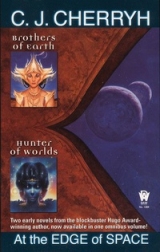
Текст книги "At the Edge of Space (Brothers of Worlds; Hunter of Worlds)"
Автор книги: C. J. Cherryh
Жанр:
Космическая фантастика
сообщить о нарушении
Текущая страница: 36 (всего у книги 36 страниц)
Daniel rose, turned his face to Tejef, appealing to him; he wanted to speak, wanted desperately, but Daniel’s courage was the kind that could act: he had no eloquence, and words always came out badly. In pity, Aiela said it. Daniel would not yield otherwise.
“We interfered. I did. We are sorry.”
And to Aiela’s dismay the iduve gave back all about them, and they were alone in the center with Tejef—and Daniel moved closer to Isande, who clenched Arle’s hand tightly in hers, and gazed fearfully as Tejef gained his feet.
“Kamethi,” said Chimele, “I have not heard, I have not noticed this behavior. You are dismissed. Go away.”
“He had honor among his kamethi,” said Aiela, echoing what was in Daniel’s heart. It was important Tejef know that before they left. The idoikkhetouched, began and ceased. Isande radiated panic, she with the child, wanting to run, foreseeing Daniel’s death before their eyes—Aiela’s with him. It was her unhappiness to have asuthi as stubborn as herself—her pride, too. They were both mad, her asuthi, but she had accepted that already.
And Chimele looked upon the three of them: a kallia’s eyes might have varied, shown some emotion. Hers scarcely could, no more than they could shed tears. But Aiela pitied her: if he had disadvantaged her once before her nasithialone and merited her anger, he could only surmise what he did to her now with the entire Metakhisand nasulto witness.
“Chimele-Orithain,” he said in a tone of great respect, “we have obeyed all your orders. If a kameth can ask anything of you—”
A tall shadow joined them—Ashakh, who folded his arms and gave a nod in curt deference to Chimele.
“This kameth,” said Ashakh, “is about to encounter trouble with which he cannot deal. He is a peculiar being, this m’metane,a little rash with us, and without any sense of takkhenesto feel his way over most deadly ground; but his chanokhiaappeals to me. I oppose his disrespect, but I am not willing to see harm come to him or to his asuthi—one of whom is, after all, human as well as outsider, and even more ignorant of propriety than this one. I have borne with much, Chimele. I have suffered and my srahas suffered for the sake of Ashanome.But this kameth and his asuthi are of worth to the nasul.Here I say no, Chimele.”
“Ashakh,” said Chimele in a terrible voice, “it has not been the matter of the kamethi alone in which you have said no.”
“I do not oppose you, Chimele.”
“I perceive otherwise. I perceive that you are not takkhewith us in the matter of Tejef, that someone lends him support.”
“Then you perceive amiss. My m’melakhiahas always been for the well-being of Ashanome.We have been able to compose our differences before, nasith-tak.”
“And they have been many,” said Chimele, “and too frequent. No!” she said sharply as Tejef moved. He came no closer, for there were the dhis-guardians between, and Khasif and Ashakh moved to shield her as reflexively as they always had. The closeness was heavy in the air again: oppressive, hostile, and then a curiously perturbing fierceness. Chimele glanced at Rakhi in alarm.
“You do not belong here,” she said, but her anger seemed smothered by fright, and it was not clear to whom she spoke.
Tejef moved nearer, as near as the ghiakaiwould permit. “Chimele-Orithain. You cast me out; but Mejakh’s takkhenoisis gone and the touch of the nasulis easier for that, Chimele sra-Chaxal. I have always had m’melakhiafor this nasul,and not alone for the nasul.I was nas,Chimele.”
Chimele’s breath was an audible hiss. “And your life in the nasulwas always on scant tolerance and we have hunted you back again. Your m’melakhiais e-takkhe—e-takkheand unspeakably offensive to me.”
A fierce grin came to Tejef’s face. He seemed to grow, and set hands on knees as he fell to kneel on the carpets. His gesture of submission was itself insolence; slowly he inclined his body toward the floor and as slowly straightened.
Arle cried out, a tiny sound, piercing the intolerable heaviness in the air. Isande hugged her tightly, silencing her, for Ashakh sent a staccato message to the three idoikkheisimultaneously: Do not move!
“Go!” Chimele exploded. “If you survive in the nasul,I will perhaps not seek to kill you. But there is vaikkayou have yet to pay, o Tejef no-one’s-getting.”
“My sra,” answered Tejef with cold deliberation, “will have honor.” But he backed carefully from her when he had risen.
“You are dismissed,” Chimele said, and her angry glance swept the hall, so that Tejef had no more than cleared the door before others began to disperse in haste, projections to wink out in great numbers, the concourse clearing backwards as the iduve departed into that part of the ship that was theirs.
“Stay,” she said to the nasithi-katasakkewhen they would as gladly have withdrawn; and she ignored them when they had frozen into waiting, and bent a fierce frown on Aiela. The idoikkhesent a signal that made him wince.
M’metane, it is your doing that I bear this disadvantage. It is your doing, that gave this beingarastiethe to defy me, to draw aid from others. Your ignorance has begun what you cannot begin to comprehend. You have disadvantaged me, divided thenasul, and some of us may die for it. What are you willing to pay for that,m’metane that I honored, whatvaikka can you perceive that would be adequate?
He stared at her, pain washing upward from the idoikkhe,and was stricken to realize that not only might he lose his life, he might in truth deserve it. He had Isande’s misery to his account; now he had Chimele’s as well.
And in the disadvantaging of an Orithain, he had threatened the existence of Ashanomeitself.
“I did what was in me to do,” he protested.
Ashakh saved him. He realized that when the pain cleared and he heard Isande and Daniel’s faint, terrified presences in his mind, and felt the iduve’s viselike grip holding on his feet.
“Chimele,” said Ashakh, “that was not disrespect in him: it was very plain kalliran logic. And perhaps there is merit in his reasoning: after all, you found chanokhiain him, and chose him, so his decisions are, in a manner of speaking, yours. Perhaps when one deals with outsiders, outsider-logic prevails, and events occur which would not occur in an iduve system.”
“I perceive your m’melakhiafor these beings, Ashakh, and I am astounded. I find it altogether excessive.”
The tall iduve glanced aside, embarrassed. “I comprehend the chanokhiathat Tejef found in these beings, both human and kallia.”
“You were responsible for swinging the takkhenesof Ashanometoward Tejef—your vaikkafor Chaikhe.”
Again he had looked toward her, and now bowed his head slightly. “Chaikhe is dhisais—as Rakhi can tell you: beyond vaikkaand no longer appropriate for my protection. I understand what you did, since you did not spare Rakhi, for whom you have most regard, and I admire the strength and chanokhiaof your action, o Chimele. You disadvantaged me repeatedly in your maneuvering, but it was in the interests of Ashanome.”
“Is it in our interests—what you have done?”
“Chimele,” said Rakhi softly, and such a look went between them that it seemed more than Rakhi might have spoken to her in that word, for Chimele seemed much disquieted.
“Khasif,” said Chimele suddenly, “can you be takkhewith this matter as it is?”
Khasif bowed. “I have brought you Tejef; and that vaikkais enough. He is srato me, Chimele, as you are. Do not ask me questions.”
“Chaikhe—” Chimele said.
“Orithain,” said Rakhi, “she has followed your orders amazingly well: but remember that she was scarcely out of the dhiswhen she acquired Tejef’s interest.”
Her lips tightened. “Indeed,” she said, and after a moment: “Aiela, the harachiaof yourself and your asuthi is a disturbance for the moment. You did serve me and I rejoice in the honor of your efforts. You are dismissed, but you still owe me a vaikkafor your presumption today.”
He owed her at least the same risk he had taken for Tejef, to restore what he had stolen from her, though every instinct screamed run!“Chimele,” he said, “we honor you—from the heart, we honor you.”
Chimele looked full into his eyes. “ M’metane,” she said, “I have a m’melakhiafor the peculiarity that is Aiela Lyailleue. Curiosity impels me to inquire further and to refrain from dealing with you as you have so well deserved. You are the only m’metaneI have seen who has not feared to be m’metaneamong us. You are Ashanome’s greatest living curiosity—and so you are free with us, and you are getting into the perilous habit of taking liberties with Ashanome.The contagion has spread to your asuthi, I do perceive. In moderation, it has been of service to me.”
“I am honored by your interest, Chimele.”
Her attention fumed then to Ashakh. By some impulse that passed between them, Ashakh bowed very low, hands upon his thighs, and remained in that posture until Chimele’s agitation had passed. He seemed to receive that too, for he straightened without looking up before, and slowly lifted his face.
“Chimele, I protest I am takkhe.”
“I perceive your approval of these outrageous beings.”
“And I,” said Ashakh, “feel your disapproval of me. I am disadvantaged, Chimele, for I do honor you. If you insist, I shall go arrhei-nasul,for my m’melakhiais not adequate to challenge you, certainly not at the peril of the dynasty itself. You are essential and I am not. Only permit me to take these kamethi with me. Arastietheforbids I should abandon them.”
Chimele met his eyes a moment, then fumed aside and reached for Aiela’s arm. Her incredibly strong fingers numbed his hand, but it was not an act of anger.
“When we deal with m’metanei,” she wondered softly, “are we bound by the kastienyou observe? I protest we are akita, m’metane.”
“I do not understand,” Aiela said.
“We are takkhe,” she said to Ashakh then, and walked away into the inner recesses of the paredre.
One did not often see the nasithi-katasakkeon the kamethi level; and the presence of Rakhi caused a mild stir—only mild, for even the kamethi knew the eccentricity of this iduve. So it was not a great shock for Aiela and Isande to find the nasithgreeting them in passing. Beside them the great viewport showed starry space, no longer the sphere of Priamos. Ashanomewas free and running again.
“Sir,” the kamethi acknowledged his courtesy, bowing at once.
“And that third person?”
“‘I am here,’” said Daniel through Aiela’s lips. Trouble, Aiela? What does anas want with us at this hour?
Be calm. If Chimele meant harm, she would do that harm for herself, with no intermediary.Aiela compelled his asuthi to silence and kept his eyes on Rakhi’s so the nasithshould not know that communication flickered back and forth: this three-way communication bemused one to a point that it was hard not to appear to drift.
“Is the asuthithekkhepleasant?” Rakhi wondered, with the nearest thing to wistfulness they had ever heard in an iduve.
“It has its difficulties,” Aiela answered, ignoring the feedback from his asuthi. “But I would not choose otherwise.”
“The silence,” said Rakhi, “is awesome—without. For us the experience is not altogether pleasant. But being severed—makes a great silence.”
Aiela understood then, and pitied him. It was safe to pity Rakhi, whose m’melakhiawas not so fierce. “Is Chaikhe well, sir?”
“She is content. She is inward now—altogether. Dhisaiseigrow more and more that way. I have felt it.” Rakhi silenced himself with an embarrassed glance toward the viewport. The body of Ashanomepassed under the holding arm. For a moment all was dark. Their reflections, pale kallia and dusky iduve, stared back out of the viewport. “There is a small amaut who mentioned you with honor. His name is Kleph. Ashakh bade me say so: arastietheforbids the first of Navigators should carry messages. This person was greatly joyed by the sight of the gardens of Ashanome.Ashakh procured him this assignment. Arastietheforbade—”
“—that Ashakh should admit to gratitude.”
Rakhi frowned, even he a little nettled to be thus interrupted by a m’metane.“It was not chanokhiafor this amaut to have delivered Ashakh in a helpless condition aboard the base ship. This being could not appreciate vaikkain any reasonable sense, save to be disadvantaged in this way. Has Ashakh erred?”
“No,” said Aiela, “and Ashakh knows he has not.”
The ghost of a smile touched the nasith’sface, and Aiela frowned, suspecting he himself had just been the victim of a bit of iduve humor, straightfaced in delivery. Perhaps, he thought, the iduve had puzzled out the ways of m’metaneimore than the iduve chose to admit. Yet not even this most gentle of iduve was to be provoked: one had to remember that they studiedgratitude, could perhaps practice it for humor’s sake. Whether anything then stirred the cold of their dark hearts was worthy of debate.
Let be with him,Isande advised. Even Rakhi has his limits.
“ M’metanei,” said Rakhi, “I should advise that you go soft of step and well-nigh invisible about the paredrefor the next few days. Should Chimele summon you, as she will, be most agreeable.”
“Why, sir?” asked Isande, which was evidently the desired question.
“Because Chimele has determined a vaikkaupon Tashavodhthat the Orithanhe and its ban cannot deny her.” The iduve grinned despite himself. “Kharxanen’s m’melakhiafor a bond with the dynasty of Ashanomeis of long standing—indeed, the origin of all these matters. It will go frustrated. The Orithanhe itself has compelled Kharxanen and Tejef to deny they are srato each other; so Kharxanen cannot claim any bond at all when Chimele chooses Tejef for the kataberiheof Ashanome.Purifications will begin. One child will there be; and then this nasTejef will have a ship and as many of the okkitani-asand kamethi as Chimele chooses to send with him.”
“She is creating a vra-nasul?” asked Isande, amazed. “After all the grief he has caused?” Resentment flared in her, stifled by Daniel’s gladness; and Aiela fended one from the other.
“They are takkhe,” said Rakhi. “ M’metane,I know your minds somewhat. You have long memories for anger. But we are not a spiteful folk; we fight no wars. Chimele has taken vaikka,for his sraas a vra-nasulwill serve Ashanomeforever; but the srashe will take from him under her own name as her heir will forever be greater than the dynasty he will found. Vra-nasulin mating can put no bond on orith-nasul.So Tejef will make submission and both will keep their honor. It is a reasonable solution—one of your own working, m’metanei.So I advise you keep secret that small vaikkaof yours lest Chimele be compelled to notice it. She is amused by your chanokhia:she has struggled greatly to attain that attitude—for if you know us, you know that we are frequently of a loss to determine any rationality for your behavior. We make an effort. We have acquired the wisdom to observe and wait upon what we do not understand: it is an antidote for the discord of impulses which govern our various species. I recommend the practice to you too, kamethi.”
And with a nod of his head he went his way, mounted into the lift, and vanished from sight.
Aiela,came Isande’s thought, Chimele sent him.
We have been honored,he replied, and expected argument from Daniel.
But Daniel’s consciousness when it returned to them dismissed all thoughts but his own for the moment, for he had suddenly recognized across the concourse a human child and a red-haired woman.
He began, quickly, to thread his way through the traffic; his asuthi in this moment gave him his privacy.
Glossary of Foreign Terms
I
THE KALLIRAN LANGUAGE: like human speech in its division of noun and verb concepts. There is, however, a fossilized Ethical from the time of the Orithain Domination. Although the Ethical corresponds to the Verb of Orithain speech, it has been made an Adjective in the kalliran language.


II
THE IDUVE LANGUAGE: differs from both kalliran and human speech to such a degree that translation cannot be made literally if it is to be understandable. Paraphrase is the best that can be done.
First, there is no clear distinction between the concepts of noun and verb, between solid and action. Reality consists instead of the situational combination of Tangibles and Ethicals; but an Ethical may be converted to a Tangible and vice versa. Most ideas are grammatically complete in two words: an Ethical is affixed to the Tangible. Meanings may be altered or augmented by Prefix, Infix, or Suffix upon either Ethical or Tangible. The nature of these added particles may be: Negative, Intensitive, Honorific, Hypothetical, Interrogative, Imperative, Directional, Futuritive or Historical, Relational or Descriptive.
Second: the language has only scant designation of gender. It is impossible to distinguish sex save by adding the male Honorific -tojor the female Honorific -takto the word in question. Concepts which would seem to make gender distinction inevitable (man, woman, mother, father, brother, sister, husband, wife) exist only as artificial constructs in the iduve language.
In the pronunciations given below, an asterisk (*) indicates a guttural sibilant produced by -kk or -kh-: a throat-sounded hiss resembling a soft kh.







III
THE AMAUT LANGUAGE: similar to kalliran speech in structure, with many kalliran words appropriated into the language, and showing much tendency to imitate the elaborate politeness styles of the iduve. The alphabet is native, but literature as such dates from first contact with the iduve.


DAW Titles by
C.J. CHERRYH
THE FOREIGNER UNIVERSE
FOREIGNER
INVADER
INHERITOR
PRECURSOR
DEFENDER
EXPLORER
THE ALLIANCE-UNION UNIVERSE
DOWNBELOW STATION
MERCHANTER’S LUCK
FORTY THOUSAND IN GEHENNA
SERPENT’S REACH
BROTHERS OF EARTH
HUNTER OF WORLDS
THE FADED SUN Omnibus:
Kesrith| Shon’jir| Kutath
The Chanur Novels
THE CHANUR SAGA Omnibus:
The Pride Of Chanur| Chanur’s Venture| The Kif Strike Back
CHANUR’S HOMECOMING
CHANUR’S LEGACY
THE MORGAINE CYCLE
THE MORGAINE SAGA Omnibus:
Gate of Ivrel| Well of Shiuan| Fires of Azeroth
EXILE’S GATE
OTHER WORKS:
THE DREAMING TREE Omnibus:
The Tree of Swords and Jewels| The Dreamstone
ALTERNATE REALITIES Omnibus:
Port Eternity| Wave Without a Shore| Voyager in Night
ANGEL WITH THE SWORD
CUCKOO’S EGG
VISIBLE LIGHT
SUNFALL








